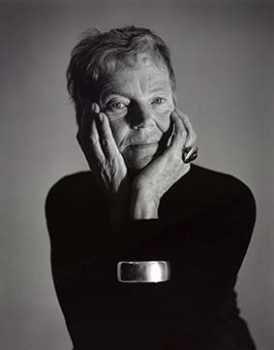Writer in demand
Issue 3/1982 | Archives online, Fiction, poetry

Märta Tikkanen. Photo: Stefan Bremer
Poems from Århundradets kärlekssaga (The Love Story of the Century)
Märta Tikkanen (born 1935), a Finland-Swedish journalist, teacher and mother of four children, made her literary debut with the novel Nu imorron (‘Now tomorrow’) in 1970. It is a story of the liberation of one woman who breaks free from her traditional role. Her next novels, Ingenmansland (‘No man’s land’, 1972) and Vem bryr sej om Doris Mihailov (‘Who cares about Doris Mihailov’, 1974) brought her fame in Scandinavia, but it was not until her fourth novel, Män kan inte våldtas (Manrape, translated by Alison Weir, Virago, 1978) appeared in 1975 that she made her international breakthrough. To date the book has been translated into eight languages and a film adaptation has been made by Jörn Donner.
Her next work, a cycle of poems called Århundradets kärlekssaga (The Love Story of the Century, 1978) became very popular: it has been translated into seven languages as well as adapted for radio, television and the stage . In 1979 she was awarded the Nordic Women’s Alternative Literature Prize. Die Liebesgeschichte des Jahrhunderts, a monologue play based on Verena Reichel’s translation (Rohwolt Taschenbuch Verlag, 1981) is presently being staged in some twenty theatres in West Germany, Austria and Switzerland. Recently Der Spiegel devoted a page to her career. The American première, directed by Margaret Booker, will take place in Intiman Theatre, Seattle.
The Love Story of the Century is in a way a reply to Henrik Tikkanen’s – Märta’s husband – autobiographical novels, in which he spares neither himself nor his wife in telling the story of their marriage (one of which has been translated into English by Mary Sandbach under the title Snobs’ Island, Chatto and Windus, 1980, see Books from Finland 1/1981). In turn, Märta Tikkanen passionately describes how a woman who has been brought up within the confines of middle-class conventionality lives through a marital hell, which is the result of her husband’s dipsomania. She interprets his alcoholism as a weapon in the power struggle within the family, and is forced to acknowledge her intense hatred as well as her love for him. These simple poems speak of woman’s endurance, warmth, her desire to love and care, and her revolt. In another cycle of poems, Mörkret som ger glädjen djup (‘The darkness that deepens joy’, 1981) Märta Tikkanen turns her attention to a relationship between a mother and her talented but mentally disturbed son. Her latest book is called Sofias egen bok (‘Sofia’s own book’, 1982). She tells the story of her own handicapped child who suffers from Minimal Brain Dysfunction. The book also includes an explanatory appendix on MBD by Dr Katarina Michelsson.
Märta Tikkanen writes about the dark side of life: alcoholism, rape, child abuse, mental instability. All her books are written from a distinctly feminine point of view. Expressing her own bitterness, tenderness, anger, love and rage, Märta Tikkanen speaks and has spoken to the concern of thousands of women.
![]()
1.
At first it feels good
quite incredibly and tremendously good
that in spite of everything
there are also people who see
behind the façade
who know
and realize
But then everything
gets only more difficult
And the question comes:
Why don’t you leave?
Innumerable times I’ve been
on my way
if this drinking bout isn’t
the last
then I’ll leave
if his malice affects
the children
then I’ll leave
If he also starts to lie
then I’ll leave
and if he ever uses force
on me
then I’ll leave
when the children can no longer
take it
then I’ll simply have to
And all of it happened
Still, I didn’t leave
Why?
2.
Keep your roses
clear the table
instead
keep your roses
lie a little less
instead
keep your roses
listen to what I say
instead
love me less
respect me more
Keep your roses!
3.
I won’t allow
my work to take time
away from my family
this I promised myself
when I escaped from suburbia
the last second
That’s why I smooth out the lines
on my forehead
when I go through the doorway
in the evenings
the smoother my forehead
the more tired I am
That’s why I often smile
when I’m home
the more I smile
the bigger the troubles I’ve got
to deal with on the job
That’s why I read stories
in a mild voice
and sit for hours at bedsides
and listen to ABBA
the more results of ice-hockey matches
I guess at
the more involved I am
in my own problems
That’s why I completely agree
with all your theories of art
and all your denunciations of the Soviet Premier
I always agree completely
am extra ready
for acrobatic sex
the more intensely I long to
sit down at the typewriter
I almost totally manage
to hide from my family
the fact that I, too
have a life of my own
to live
Translated by Stina Katchadourian
No comments for this entry yet
Trackbacks/Pingbacks:

4 July 2017 on 9:07 pm
[…] The Love Story of the Century (Århundradets kärlekshistoria) by Märta Tikkanen (Finland) […]